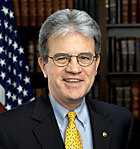
The Centers for Medicare & Medicaid Services should move faster to make changes based on Medicare audits and should have more direct oversight over Medicaid, according to bipartisan legislation introduced Tuesday.
“The Preventing and Reducing Improper Medicare and Medicaid Expenditures Act of 2013” proposes a variety of reforms to cut down on waste, fraud and abuse. The PRIME Act was introduced by Sens. Tom Carper (D-DE) and Tom Coburn (R-OK), and Reps. John Carney (D-DE) and Peter Roskam (R-IL).
CMS would be less dependent on contractors for program oversight if the bill passes. The agency would be funded to hire more full-time staff dedicated to Medicaid integrity, to cultivate more “in-house program integrity expertise.”
CMS also would face increased pressure to act more quickly and effectively on reports from Recovery Audit Contractors about vulnerabilities leading to improper payments.
The 2012 error rate for the Medicare fee-for-service program was 8.5%, which equaled nearly $30 billion in improper payments, according to the legislation. Department of Defense reimbursement contractors are liable for any amount exceeding a 2% error rate, and the PRIME Act proposes a similar system for Medicare Administrative Contractors.
“The plan may include a sliding scale of bonus payments and additional incentives for MACs that reduce their error rates to certain benchmark levels and may include substantial reduction in payments under award fee contracts, for MACs that reach certain error thresholds,” according to the draft legislation.
Other PRIME provisions include: beefing up Medicare fraud education for seniors and increasing whistleblower rewards; requiring National Provider Identifiers on pharmacy claims; and improving data sharing protocols.



